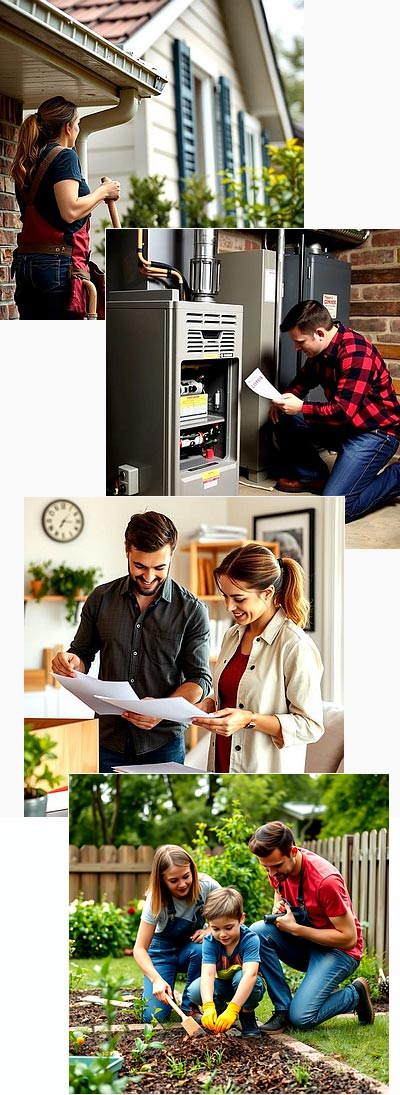10 Low-cost Tips for New Homeowners
Here are 10 low-cost tips that new homeowners often overlook, sometimes to their own detriment. While some may seem obvious as you read them, it's true that doing the obvious is often the easiest thing to put off until later, or even to ignore it until it's forgotten and doesn't get done at all.Following these tips can can help you protect your castle—no moat required!
- Maintain Your Home
Regular maintenance is essential for keeping your home in good condition. This includes tasks like cleaning gutters, changing air filters, inspecting your roof, and making repairs early rather than later when it may cost more due to inflation or additional damage.
- Save for Repairs Before They Are Needed
Beyond your routine expenses like mortgage payments and property taxes, create a savings plan for home repairs and improvements. This will help you prioritize necessary repairs and plan for future projects.
- Prepare for Emergencies
Know how to shut off the water to your whole house and to individual faucets. You don't want a minor leak to become a major repair. Also, know where your circuit breakers are and which ones shut off which parts of your house.
Smart Move: Be prepared for emergencies like power outages or natural disasters. Make sure you have adequate emergency supplies on hand for items like medicines, food enough for several days, bandages, batteries, etc.
- Stay Organized
Keep important documents and paperwork related to your home in a safe place and in an organized way. This includes mortgage documents, home insurance policies, and receipts for home improvements, which may have tax benefits.
- Take Photos
Take photos of your home, including the furniture and any expensive items covered by your policy. If your house is broken into or damaged in a natural disaster, having photos to prove your assets can be very valuable in recovering a better payout from your insurance company. Along with the photos, keep an up-to-date inventory of your insured assets, including the prices paid and the receipts for the goods if you have them.
Smart Move: While no one expects a disaster, they do happen. Keep your records in a fire-proof safe and/or keep a second copy in another safe location. If your house should burn down, for example, you don't want your proof of assets to burn up with it.
- Keep Your Insurance Up to Date
This includes more than just paying your premiums on time. It includes making sure your insurance coverage is keeping up with inflation. Also, if disaster should strike, you want to get the claim rolling quickly, so keeping your insurance contact in your smart phone contact list can be a time-saver.
- Be a Good Neighbor
Build good relationships with your neighbors and be respectful of their property. This may seem obvious, but it's often overlooked in our fast-paced world. Doing this, however, can create a sense of community in your neighborhood, making it a safer and more pleasant place to live.
- Read Your Manuals and Warranties
This one may sound a little boring, but it's not as painful and shelling out money for an expensive repair when reading this material might have prevented it. So...
When you move into your new home, take time to read the manuals and warranty information for your appliances, HVAC system, and any other major features. Knowing how to properly use and maintain them can extend their life and help you avoid costly mistakes. Keep all this information organized in one place for easy reference.
- Landscape
There's usually not a lot of landscaping that comes with a Habitat house beyond leveling the lot and seeding the grass. Adding your own landscaping can help make the outside of your new home feel more like you. If you have children who are old enough to participate, bringing them into it can be a fun and educational family activity.
You might consider adding a small garden, too. Home grown food is generally more nutritious, better tasting, and costs less than the same items bought at a store.
- Deep Clean Once a Year
A deep clean can make your home feel like new again. This includes tasks like cleaning windows, scrubbing floors, and deep cleaning carpets. It can also help you locate needed repairs before they become bigger, more expensive problems.

Bonus Tips!
These are on the more expensive side and not necessarily for new homeowners so we include them as a bonus.- Invest in Energy Efficiency
Energy-efficient upgrades like insulation, weather-stripping, and energy-efficient appliances can decrease utility costs and increase your home's value.
-
Install Smart Technology
As with the previous tip, smart home technology like a programmable thermostat, a tankless water heater, or solar panels can also increase your home's energy efficiency and lower your utility bills.
-
Keep Your Home and Family Safe
Invest in a good security system and make sure your doors and windows close and lock tightly. This will help keep your home secure and your family safe.
-
Update Your Home
Keep your home up-to-date with modern styles and technology. This can increase the value of your home and make it more attractive to potential buyers if you decide to sell in the future.
-
DIY Projects
Consider DIY projects like building a deck, installing new countertops, or erecting a privacy fence in your backyard. These can not only add a personal touch to your home, but can increase it's value as well.

That's a wrap! We hope you've gained something from our tips. Feel free to share this page with your friends and family. You never know what they might pick up that will help them.